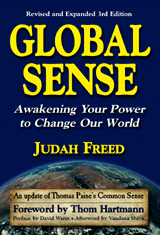|
2005 ICANN Links |
. |
. |
|
|
.. Presumed powers & responsibilities.. Formed initially by the U.S. Government, ICANN is assuming responsibility for Internet protocols (IP), the numerical IP addresses assignments, the domain name system (DNS) overlaying the IP numbers, and the root zone file servers with all the DNS data. Controlling these four critical tasks gives ICANN virtual control over the entire Internet infrastructure -- and its accelerating growth. . ICANN Structure and OperationsAccording to its own official website, ICANN "is the new non-profit corporation... formed to take over responsibility for the IP address space allocation, protocol [IP] parameter assignment, domain name system management, and root server system management functions performed [for the entire Internet] under U.S. Government contract by IANA and other entities." Seeing how ICANN describes itself provided insights into the organization's self-concept, which lets us understand the organizational vision driving ICANN activities. The ICANN Board:Says ICANN, "The Board of ICANN will be composed of nineteen Directors, nine At-Large Directors, nine to be nominated by Supporting Organizations, and the President/CEO (ex officio). The nine At-Large Directors of the Initial Board are serving one-year terms and will be succeeded by At-Large Directors elected by an at-large membership " Esther Dyson, Interim Chair (1999):Appointed as interim chair of ICANN sits Esther Dyson, media activist from the Electronic Frontier Foundation (EFF), author of Release 2.0, and the owner of EDventure Holdings in NYC. Dyson chose not to become the "initial" chair when the Board redefined itself. Even so, critics still call for her prompt resignation. She has pledged to stay through the end of her term in October 2000, and by then she's promised that ICANN will be wholly democratic. Michael Roberts, President & CEO: (1999)Appointed an "interim" executive officer overseeing a tiny staff and implementing Board policy is Michael Roberts, one of the founders of The Internet Society and its first executive director. Most recently, he was the vice president in charge of networking and telecommunications for the EDUCOM consortium of 600 colleges and universities, this after being the telecom director at alma mater Stanford University. Roberts also has been at the center of the Internet2 project, an emergent broadband network for research and education, mirroring the educational origins of today's narrowband "Internet1." At-Large Council:At the Santiago meeting in August, the Board passed a resolution about the At-Large Council. Individuals joining the At-Large Council now will not be allowed to vote directly for their At-Large Board members. Instead, the At-Large Council will elect 18 of the Council members to a committee, which then will select directors for the nine seats specified in the Bylaws. Five of these seats must obey the Board's rules for diverse geographic representation. The other four directors can be selected from anywhere on earth; however, no two of the nine At Large directors can come from the same country.
ICANN
Activities
|
. |
. |
action
steps ICANN
faces bankruptcy while desperately seeking
funds
action
steps The
fundraising campaign would be based on |
|
|
. |
. |
|
|
|||||||||||||||||||||||||||||||||
|
Media Visions Journal | Copyright 1997-2003 by Judah Ken Freed - All Rights Reserved Last update: 7 APRIL 2003 |
|||||||||||||||||||||||||||||||||
.




